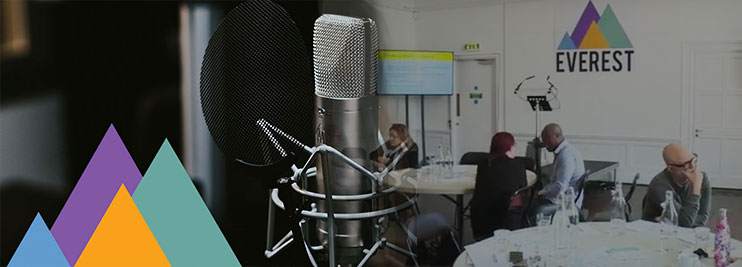Why Your Training Company Should Be Hosting Events & How To Do It Well

Last week, we launched our first ever episode of the Everest Podcast. The Everest Podcast’s aim is to offer helpful insights; tips, and lots of sound advice on a broad number of training related topics. Much of our content will be aimed at helping training providers scale-up their business and achieve their goals.
We welcomed Andrew Thomas from Digital 22, an Inbound marketing agency based in Clitheroe, into the office to talk about their quarterly event, the ‘HubSpot HUG’; why training companies should host their own events, and how to market and leverage them to their full potential.
Why Host A Conference or Event?
Andrew talked to us about Digital 22’s own event, the Hubspot HUG, and how this benefited them as an agency. When Digital 22 first considered hosting their own event, they thought they might be too small and that the event itself might prove too expensive. Andrew told us that these concerns were absolutely unfounded. From an inbound marketing perspective, an event is exactly the kind of thing that organizations, big or small, should be hosting, in-order to get their name out there. The very fact that you’re out there, solving industry related issues for people, gives you a head-start in terms of visibility, and builds trust within your industry.
"You can start anywhere. If you've got a decent size meeting room in your offices, and you're central, you could have it at your own offices. These things don't need to cost a lot of money. All you need is a slide deck and a projector, you know, venues often put them on for you. And we started informally, so nobody expected lanyards and swag, you know, it was just, turn up. “We're going to get some takeaways” and that's it.”
There are many more reasons, from a marketing perspective, to hosting an event. The ability to utilize industry experts in the form of blogs; podcasts; slide-decks, and more post-event, is a massive win for your website content efforts, as well as communications with existing and perspective customers...
Best Practice For Hosting And Marketing An Event
Send good emails
We spoke to Andrew briefly about the newest trends in the marketing industry. Andrew told us that the predominant trend this year, was a return to more personal emails.
For a long time now, we’ve been automating marketing emails- but no-more! Andrew tells us that people prefer to feel like they are being spoken to by someone who’s put some thought into their email. We get spammed every day by automated marketing emails, so it’s a nice touch to start writing them yourself again.
This is worth thinking about when sending communications about your event… a well-thought-out email will attract more people than an automated reminder. This doesn’t mean you have to write each contact's email out individually of course, but that your template is well-designed and you have thought about what content people want to see within it.
Send reminders
Andrew tells us not to worry about sending plenty of reminders to people. Of course, we all worry about spamming, but don’t let this sway you into under-reminding people. Andrew tells us that they usually start a few months before the event, with an email every month. Closer to the time, they will send an email reminder every week. And even a reminder on the day, so that people who live nearby might be reminded to pop-in.
It’s important to plan your emails and email schedule before-hand, in the planning stage, to ensure you don’t forget, or get too busy to deal with them.
Keep it simple
Your first events don’t need to be fancy. You don’t need to have expensive speakers or equipment. Andrew tells us that it can be as simple as a quarterly meetup and chat in a coffee house. Whatever suits your company and the issues you’re tackling at your event.
An event certainly doesn’t have to cost you lots of money. Andrew tells us that as long as your event is solving an issue and is of value to people, it won’t matter if it’s a totally casual affair.
Have tickets - even if they’re free
Digital 22 don’t charge for their HUG event, however, they do have people sign-up:
“We don't really have a limit on seats apart from the venue, which could probably fit about 70 people, but we get people to reserve a spot. So, there's that buy in. People think, you know, I'm buying a ticket, it's free, but once people commit to reserving a spot, they're more likely to turn up we found.”
Find out what people want and meet a need
Andrew suggests that you need to ask your audience what they are looking for in an event, before you even start planning it. The most important aspect of a good event is that you are providing value to your potential attendees. This means that will people will keep coming back each session, and you will continue to attract new attendees with fresh and relevant content.
“Really define the outcomes like: what are people struggling with? What are the regularly asked questions that you're trying to solve? Is there a theme? Whatever it is in your industry, just try to base it around that and give people a clear indication of what they're going get out of the event.”
Don’t over-sell yourself
We’ve all been to that one boring event, where the host company spends the whole time selling themselves and their product or service. Don’t be that company! As we mentioned above, people will attend events that are going to offer them insights and valuable, industry specific takeaways.
Mix-up your speakers; invite guest speakers from your industry; talk about current issues and trends within your training niche- Remember, the aim of hosting an event is not to sell, but to raise your profile; be seen as an industry expert; and industry leader, and to provide yourself with plenty of inbound marketing opportunities.
Consider timing and location
Andrew talked about how important location and timing are to the number of attendees you can expect. If your offices are based outside of the town/city center, it is worth considering booking a space in the center, to make it more viable for people to attend.
Digital 22 originally started their HUG sessions in the evenings, after work, and the attendance plateaued at about 20 people. They then decided to trial it during work hours; in the mornings, which has proved to have a much higher attendance rate. He puts this down to people being more open to taking a couple hours out of work, to learn work-based things.
It may take some tweeking at the beginning, to find the right time and place for your event. Don't be afraid to change things up a bit if you're not seeing the level of attendance that you'd hoped for.
Take a register
Even if you don’t charge for your event, getting an attendance list of people who turned up and want to receive emails, has many benefits. Firstly, you can track how well your events are progressing. Secondly, you will be able to send supporting materials and reminders to the people who are definitely interested in what you’re doing. Not only this, but these people may be more open to your marketing efforts for other things too.
Get feedback
One thing that people often overlook, is post-event follow-up. At the HUG, Digital 22 make sure that there are feedback forms on every table, so people can tell them what they could do better; what they think was missing, and what they’d like included in the next session.
In our next podcast session, we will be talking to Chris Wigglesworth from CourseCheck, to really delve into what makes great feedback, and how you can utilize it to its best potential.
Share imagery and video
Once you have your marketing list of attendees (willing to receive emails), make sure that you share any content with them after the event. It’s easy to forget this part, and not get in touch until the next event is scheduled.
Andrew tells us that not contacting people until you want them to come to your next event is a big no-no! You want to foster a feeling of trust by letting people know that you care about continuing to supply them with useful information; that you don’t just want them to make your numbers look good.
So, share your blog; share your podcast; share your slide-decks, as well as other interesting things you have going on during the quarter. You will obviously want to sell to these people too, but don’t go in too strong; don’t overkill on the sales; add value, always, or you risk breaking that ‘Inbound approach’ trust you’re trying to build. Find more information on content marketing in our eBook designed just for training businesses.
Stay in touch
“We will take a register on the day. We get the emails of the people that have turned up, and we'll send out an email after the event at the end of the day just to say, “thanks for coming, here're the slides. Or if you can give us some feedback, we'll pop the slides over to you”. And then from that point on, we may share with them a couple of things. If we do a podcast with one of the speakers, we'd share that, or we'd maybe share if there're any notes or resources that the people talking mentioned, we would then put that into an email, you know, a couple of days later.”
How often?
How often you host your events/knowledge-shares is entirely up to you. Whether it’s weekly; monthly; quarterly, or just yearly, the important thing is to let people know ahead of time when they are scheduled. Even if you only have speakers confirmed for your first event, still set and send-out the dates for your next ones. This helps people to plan; reserve a spot in their diaries, and will ultimately mean that more people show-up.
Utilizing The Content - A Checklist
We’ve put together a checklist of every marketing tool Andrew mentioned in our podcast. In order to get the best out of your event, and keep people coming back, here are a few things to consider pre- and post-event:
- Blog articles
- Slide-decks and links
- Podcasts
- Webinars
- Videos
- Pictures on the day, to use on social, website, email etc…
- Quotes from attendees, for your website and marketing materials
- Survey for next event
- Opt-in for email marketing on your event register
- Regular reminder emails
Anything we’ve missed? Let us know in the comments below!
The Everest Event
accessplanit also host our own annual event for training providers, Everest. We have speakers covering a huge array of different training related topics, from marketing to mental health, and everything in-between. To keep up to date on our 2020 Everest event, visit our Everest Event page.
More On Marketing
- Digital Marketing Tips For Your Training Business
- How To Increase Online Course Bookings Using Email Marketing


